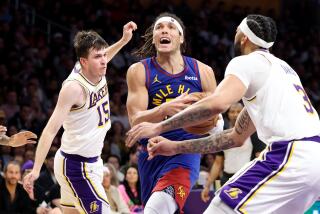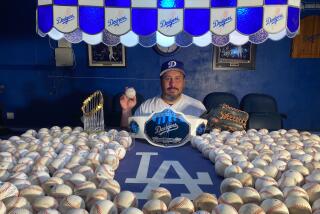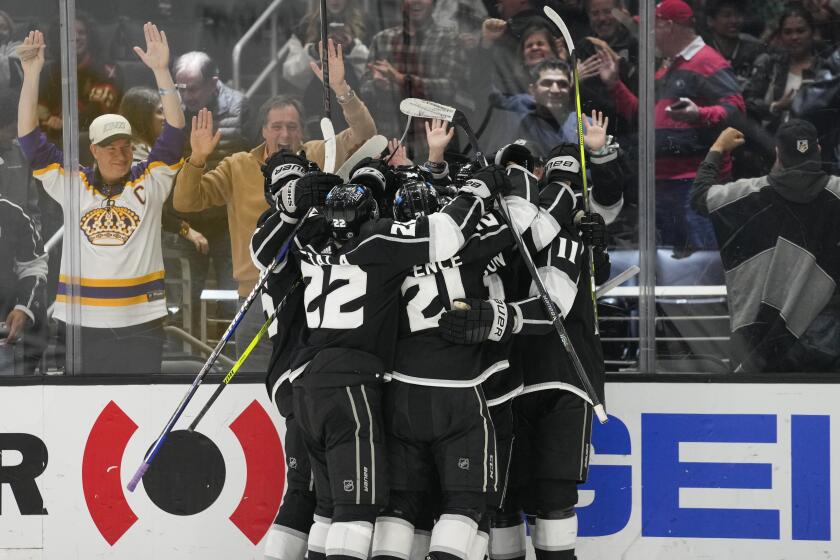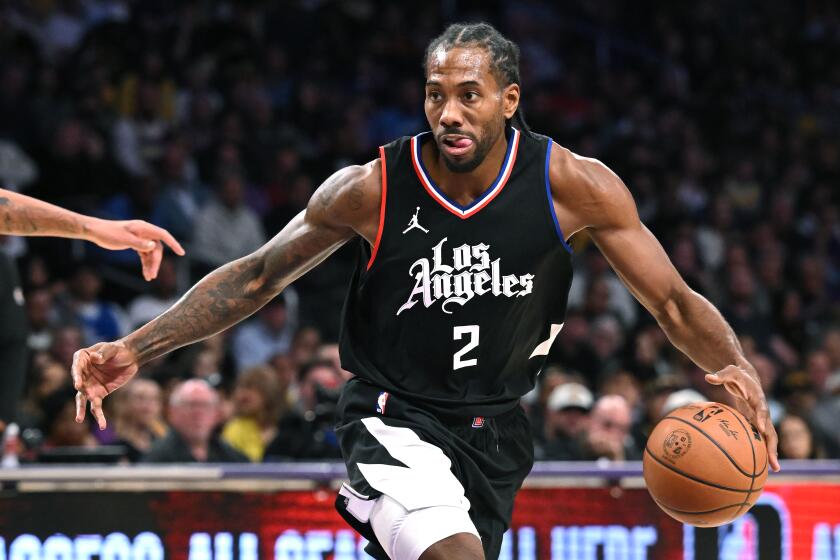Manning Wears ‘Em Out
A good, sound, up-to-date NFL team is one that rotates two defensive lines, reasoning that it has a better chance to win with eight fresh pass rushers than four tiring All-Pros.
Indianapolis quarterback Peyton Manning taught that lesson to the Tampa Bay Buccaneers and their All-Pros Monday night.
The Buccaneers sport the best front four on the continent, but they don’t rotate defensive linemen, and Manning wore the All-Pros out chasing him in the second half on a long series of long passes.
Then, in one of the great personal quarterbacking triumphs of all time, he rallied the Colts to a surprisingly easy 38-35 comeback victory with the most artistic passing show in recent NFL history, completing so many third-down throws that his official rating as a third-down passer must have bolted into the stratosphere.
As the Buccaneers blew a 35-14 lead in the fourth quarter before blowing up, Manning completed 34 of 47 passes for 386 yards even though his offensive line couldn’t protect him when the night was young and the world-champion Buccaneers were well rested.
Then, predictably, their wonderful front four — the NFL’s best since the Ram days of Deacon Jones and Merlin Olsen — wore down sprinting in to smash the Colt quarterback. He didn’t smash. And on Manning’s long overtime drive setting up the winning field goal, he made all four of the critical third-down plays that beat the best team in football.
Leaping Penalty Saves Kicker
THE LEAPING PENALTY, the rarely called restraint that gave the Colts a second chance to win in overtime Monday night after their flustered kicker, Mike Vanderjagt, had failed the first time, is in the NFL code for the players’ own protection — and it belongs there.
If you let every tall, eager professional jump any way he wants to, and as high, he might come down heavily on somebody’s leg, then spin awkwardly away, turn a cartwheel, fall on his head, and kill himself. Serious injuries on kick-prevention special teams threatened regularly in the old days before the rules were tightened.
It was one of the Buccaneers’ tiring All-Pros, Simeon Rice, who somehow summoned the energy to attempt the illegal play that awarded Vanderjagt a bonus chance to kick the football straight, which he didn’t really do, either time, but lucked out the second time when the ball hit an upright and flopped over.
Referee Johnny Grier explained the penalty: “Leaping is a player starting more than one yard off the line of scrimmage and running forward and landing on players. He jumped and landed on his own players.”
Even so, the leaping penalty isn’t what beat Tampa Bay. It was Manning who won this game. It was Manning who beat the intellectual-emotional Tampa coach, Jon Gruden, who had inherited the defense that made him the NFL champion last winter, inheriting from Tony Dungy, the Indianapolis coach who bested him this strange night in Tampa.
Gruden had seen no reason to modernize the great defensive line that Dungy willed him — modernizing with four journeymen in a rotation system with all the All-Pros — but conceivably, he sees some reason now.
For the aging defensive Buccaneers will always be vulnerable to a quarterback like Manning, a quarterback with a lively young passing arm and the young, strong legs to carry him away from Gruden’s bruisers. For the present, though, Gruden is safe. Now that Brett Favre is aging too, there’s only one Peyton Manning.
1958 Sudden-Death Game Overrated
There are so many good ways to play winning football that “the greatest game ever played” has been played many times.
Best show of them all, conceivably, was Monday night’s. Few have been able to do what Dungy and Manning accomplished in the 21-point fourth-quarter rally from 35-14 to 35-35, after which their little three-point overtime performance was a formality against Gruden’s dog-tired All-Pros.
Or, possibly, the best game ever played was played in Kansas City Sunday when unbeaten Kansas City came from behind to conquer unbeaten Denver, 24-23. Both sides scored in every quarter to keep it constantly close and dramatic before the Chiefs won with a humdrum play: another long kick return by Dante Hall, his seventh in 10 games, this one for 93 yards.
Or the best game might be coming up this week when the NFL’s new power, 4-0 Carolina, conqueror of Super Bowl-champion Tampa Bay, lines up against Manning at 5-0 Indianapolis.
Some say the big one was played 45 years ago in New York when Baltimore’s 1958 whiz team won the NFL title by eliminating the New York Giants in sudden-death overtime, 23-17. Within days, New York newspapers had christened that one “greatest game ever played” as well as “the game that made football No. l.”
But was it? Not quite, I’d say. Football had become No. 1 in the early 1950s when the Los Angeles Rams began attracting crowds of up to 90,000. The New York writers, smarting from the defection of the Dodgers and Giants to California earlier in 1958, were mainly just sending a message to baseball.
They were also honoring one of their own, the football Giants, who stayed in the East after the baseball Giants skipped out. Best of all for the New York writers, branding the 1958 sudden-death game as greatest ever was telling the world that everything worthwhile happens in New York.
Lombardi Won the Biggest Game
A BETTER CANDIDATE for best ever was the 2000 Super Bowl renewal at Atlanta, where the explosive Rams passed for a record 414 yards against Tennessee’s superb defensive team but needed a championship-saving tackle at the one-yard line to win, 23-16, on the game’s last play.
Still, football has been around for well over a century. And of the games I’ve seen in the last 66 years (including all of the above) the “greatest ever played” was presented in the Cotton Bowl on New Year’s Day, 1967, when the Green Bay Packers edged the Dallas Cowboys for the pro championship, 34-27.
It was the last NFL title game played before the start of the long Super Bowl series. And to most sports fans, it was unquestionably the biggest football game that season — which explains why the first Super Bowl didn’t sell out two weeks later in Los Angeles (where the Packers beat Kansas City, 35-10).
Matched in the Cotton Bowl that first day of 1967 were the NFL’s 1966 conference champions, a Dallas team led by the league’s only prominent passing coach, Tom Landry, and the great running team of that era, the Vince Lombardi-led Packers.
Lombardi, fearing Landry’s passes, won by abandoning his ground-power machine and repeatedly ordering Green Bay into pass formation. On a day when quarterback Bart Starr threw four touchdown passes for the Packers, they opened a 14-0 lead, only to be caught before the end of the first quarter, 14-14.
It was still close at the half, 21-17, and thereafter, but Lombardi kept Starr throwing, and although Dallas quarterback Don Meredith’s 68-yard scoring pass play was the longest of the game, Starr edged him with his last two touchdown passes.
Broncos Still Best in the AFC
DENVER DEMONSTRATED in a beautifully played Week 5 game at Kansas City that although it was to lose eventually to a kick return, it’s the best team in the AFC West and most likely in the AFC. Quarterback Jake Plummer outplayed Kansas City quarterback Trent Green and, in a matchup of running backs, Clinton Portis outperformed the Chiefs’ more famous Priest Holmes.
Assuming that injuries equalize in the meantime, the Broncos will win the rematch Dec. 7 at Denver. They have some big ones ahead — at Minnesota this month and against New England next month, among others — but they’re still on a Super Bowl course.
The kick-return touchdown that outscored Denver, Hall’s 93-yard run, was actually a 98-yard play, measuring from the point of his furthest retreat. “Oh, Dante, don’t go backwards,” Kansas City coach Dick Vermeil exclaimed. But that’s part of Hall’s style.
He can change direction quicker at speed than any peer — which tells you what makes Dante Hall run. Moreover, his ability to stop and start abruptly, instantly, is unusual. And he also has a rare knack for shifting into full speed at any moment to bypass opponents who seem to have the angle on him. Thus four big runs in four games, an NFL record. He had made three such runs late in the 2002 season.
Clearly, a Hall return is no fluke. But along the way, he has enjoyed the luck that’s ever present in football. This time, at the start of his 98-yard run, a teammate illegally clipped two opponents. He wasn’t detected, and Hall raced on.
On top of the big plays that had brought Denver’s advantage to 23-17 with seven minutes left, Hall’s long run pushed the game into the realm of game of the year or, if you prefer to wait awhile, game of the half year.
CBS Makes a Wrong Call
DURING THE WEEK, Denver-Kansas City had figured as, at least, game of the day. Here were two high-scoring pro clubs with sound defenses, both 4-0 in the standings, and both so well coached that a close fight seemed inevitable. So why wasn’t the game on the CBS channel in Los Angeles, Channel 2?
Why did CBS decide to present 2-2 Oakland at 0-3 Chicago instead? Hadn’t those two teams already proved their ineptness?
In a late-Sunday program when the Week 5 games were over, a CBS announcer, Jim Hill, called Denver-Kansas City the game of the day. But it had been that, and more, all week. Why didn’t Hill tell it to his CBS superiors before the game? Why is CBS in bed with the Raiders?
Spokesmen point to a thing or two about ratings. And it’s true that the Raiders have a following here, but Los Angeles is an increasingly sophisticated sports town that would turn up higher ratings for bigger games down the road if it saw them now week after week.
The goal of a national network with an affiliate in the Los Angeles area — a place that can count more residents from elsewhere in the nation than any other U.S. area — should be to present the big NFL game of the week every week, regardless of where it’s played. The ratings would come along.
TV Needs Colorful Games in L.A.
IT DOESN’T SATISFY sports fans to say that the Oakland-Chicago game was closely contested at the end and won in a last-second upset on a long Bear field goal, 24-21, and that, therefore, the network was justified in showing it to Los Angeles.
Close games count with sports fans, but close colorful games count more. And the Denver-Kansas City game — shown in the Oakland-Chicago time slot — figured to be both close and colorful, as it proved to be.
No pro club is harder to watch this year than the conservative, stumbling Bears, who have been stopping themselves with one penalty after another and who fell behind by 18-3 at the half Sunday and by 18-6 after three quarters though the Raiders were plodding through another off day.
Football is a three-hour game, and in the entertainment era you’ve made a poor bargain if you waste the first two hours and more only to see a little excitement at the end. Bear quarterback Kordell Stewart gets full credit for the handful of big plays that finally upset Oakland, but Los Angeles TV executives should be thinking of something else. They should remember the way Ram owner Dan Reeves built Los Angeles into the NFL’s best football town long ago.
“In this city, it isn’t enough to win,” Reeves said. “To pull in the crowds, you have to win colorfully.”
Today it’s still the same in L.A., all over TV-land. There’s more entertainment competition here than anywhere else. That goes in music, drama, movies, sports. To think Raiders is to think small. Think NFL, think bigger.
Young Passers Need Noise Experience
THE DALLAS COWBOYS, 3-1 and still leading the NFC East under new coach Bill Parcells, will get one break against the Philadelphia Eagles this week that was denied the Washington Redskins Sunday when they lost at Philadelphia, 27-25. With young quarterback Quincy Carter, the Cowboys are getting the Eagles in friendly Texas Stadium.
Washington, still second in the crowded East, could have won that tight one at Philadelphia if young quarterback Patrick Ramsey had had more experience on loud visiting fields.
The deliberate rounds of noise that handicapped Ramsey every time the Redskins had the ball make Philadelphia the worst in the league for visiting players. For, on a winning day, Eagle fans are the loudest and rowdiest in the league, showing Raider fans how.
It’s true that Carter will have to take the Cowboys into Philadelphia in December, but by then Parcells’ system will have been installed and ingrained. This is the pivotal week.
When the Redskins couldn’t hear Ramsey’s signals, they were hustled into six or seven false starts in the Eagle game, and these, and their other noise-related problems, were too much for a young quarterback to overcome.
You’d think a multi-billion dollar business organization like the NFL would take more steps to lessen the unfair home-field edge that makes the difference these days in so many close games. It could be done in several ways. But perhaps the club owners, who enjoy winning for home-town fans, don’t really want to even things up.
Call All Late Hits on QBs
ONE OTHER THING really hurt Redskin quarterback Ramsey in Philadelphia: the shots he took after the bell. In general, the officiating was sound there as usual, and the Eagles were called for one attack on Ramsey, but not the time they surrounded him in the first half and pounded him into the ground after he had dispatched a pass.
The first Eagle getting in that time had him. There was no necessity for the next two to crowd in and drive him down.
The problem with all the noise that engulfs visiting teams in NFL stadiums is, first, that it’s unfair, unjust, unsportsmanlike. The shouters have one prime objective: to unfairly cripple the visitors. But, second, the screaming home-crowd mob seems to make the home team bloodthirsty.
Ideally, NFL officials would keep that in mind. The only way to restrain the reckless is to make every penalty call, no exceptions, and make it promptly. As Commissioner Paul Tagliabue says, in cases of doubt, give the doubt to the quarterback.
Bob Oates’ book, Sixty Years of Winners, is available at latimes.com/bookstore or by calling (800) 246-4042 ($16.95).
More to Read
Get our high school sports newsletter
Prep Rally is devoted to the SoCal high school sports experience, bringing you scores, stories and a behind-the-scenes look at what makes prep sports so popular.
You may occasionally receive promotional content from the Los Angeles Times.






